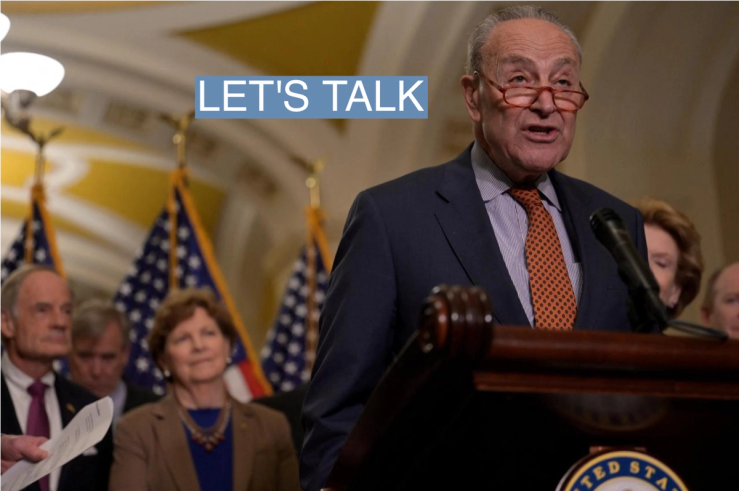The News
Senate Democrats are pursuing a mammoth China policy package — and they hope to bring Republicans along with them.
The initiative is the culmination of behind-the-scenes talks underway for at least several weeks. As envisioned by Senate Majority Leader Chuck Schumer, D-N.Y., the package would include measures to limit the export of advanced technology and investment flows to China, further domestic investments in manufacturing and tech, steps to counter China’s Belt and Road Initiative, and new moves to deter aggression against Taiwan.
Potential elements include:
- The RESTRICT Act from Sens. Mark Warner, D-Va. and John Thune, R-S.D., which would empower the White House to ban TikTok and other foreign technology platforms.
- A proposal that Sens. Bob Casey, D-Pa. and John Cornyn, R-Texas plan to reintroduce that would set up a screening process for U.S. investment in critical technologies in China and other “countries of concern.”
- A new version of the Strategic Competition Act, which would thwart Beijing’s global influence on multiple fronts. Semafor reported back in February that Senate Foreign Relations Committee leaders Bob Menendez, D-N.J. and James Risch, R-Idaho were working on the measure.
- The Countering Economic Coercion Act, a measure from Sens. Chris Coons, D-Del. and Todd Young, R-Ind. that would allow the U.S. to reduce tariffs on goods and waive requirements for export financing for countries targeted by economic coercion from China and other countries.
In this article:
Morgan’s view
While Schumer billed the effort as bipartisan, it’s already running into some skepticism on the Republican side. That could imperil the prospect of a large package passing, even if some of the components have more Republican support than others.
One Republican aide called the initiative insufficient and argued Democrats are piling on too many side issues rather than focusing more on Taiwan and military preparedness. “If we can’t get the next five years right then the 20-year plans they’re proposing don’t matter,” the aide told me.
Another Republican aide also faulted the initiative for what they described as a lack of emphasis on U.S. dependence on critical minerals from China, though Schumer insisted toward the end of his press conference that the issue would be a “very important part” of a package.
Still, a handful of Republicans are quietly engaging with Democrats on legislation to address threats posed by China and make the U.S. more competitive. A Senate Democratic aide described the efforts as a way to build on the success of last year’s CHIPS and Science Act and “go even further.”
In some cases, bipartisan bills that could be folded into the final package have already been introduced. One of those is the RESTRICT Act, a bill from Warner, who chairs the Senate Intelligence Committee, and Thune, the No. 2 Senate Republican, that would give the Biden administration the power to ban foreign technology platforms, like TikTok, that it deems post a threat to national security.
That bill has plenty of support — including from the White House — and may well soon get a mark up before the Senate Commerce Committee. A Warner spokeswoman doubted that work on the broader package would slow momentum.
“I think all this means is we have multiple potential vehicles,” she said.
Room for Disagreement
Schumer swatted away doubts about the initiative succeeding, pointing to the $280 billion semiconductor legislation that passed last year with bipartisan support when Democrats controlled both chambers.
“I know you may be skeptical but look at CHIPS and Science. It was a great bipartisan effort,” he told reporters Wednesday afternoon. “We hope to get a bill within the next several months if we can do it.”
Indeed, criticism of China is one of the few bipartisan features of Capitol Hill — even as election season approaches. The new House select committee on China has been surprisingly bipartisan, in contrast to more polarizing fights over the debt ceiling and GOP investigations.
A select committee aide said the panel hasn’t engaged with Schumer’s office but “welcomes legislative attention on the challenges posed by the CCP,” referring to the Chinese Communist Party.
Notable
- Semafor’s latest episode of the Agenda explores the sky-high geopolitical stakes driving the U.S. effort to claw back its domestic chip production by way of the CHIPS and Science Act.
- Republicans have criticized the Biden administration for attaching childcare requirements to grants funded by the CHIPS and Science Act and using the law to encourage the use of union labor.


